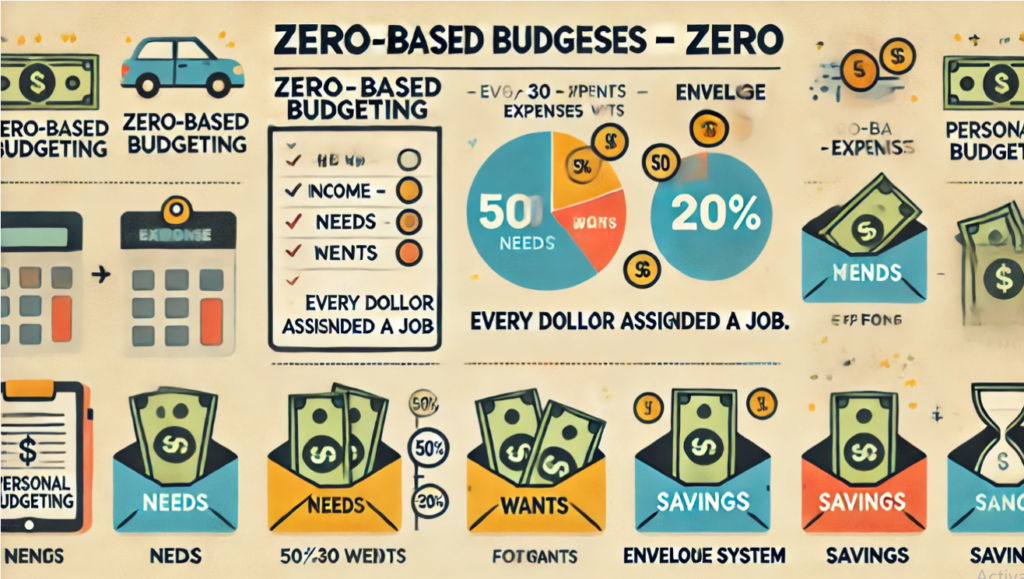
Budgeting is a crucial aspect of personal finance that plays a vital role in achieving financial stability, growth, and meeting long-term financial goals. By creating and sticking to a budget, individuals can effectively track their income and expenses, save money for future needs, and even grow their wealth over time. In this article, we will delve into the various components of budgeting, including the importance to step-by-step budget guide tracking expenses, the benefits of saving money, and strategies for growing your wealth. By understanding and implementing these budgeting principles, individuals can take control of their finances and work towards achieving their financial aspirations.
Why Budgeting is Essential

Financial Clarity:
Financial clarity is essential for managing your finances effectively. It involves understanding where your money is coming from and where it is going. This includes tracking your income, expenses, and savings to ensure that you are making informed financial decisions. By gaining a clear understanding of your financial situation, you can better plan for the future and work towards achieving your financial goals.
Debt Management:
Budgeting is a crucial tool for managing debt effectively. By creating and sticking to a budget, you can allocate specific amounts of money towards paying off debt each month. This can help you avoid accumulating more debt while also making progress towards paying it off faster. By tracking your expenses and prioritizing debt payments, you can gain better control over your financial situation and work towards becoming debt-free. Additionally, budgeting allows you to identify areas where you can cut back on spending in order to free up more money for debt repayment. Overall, budgeting is a proactive approach to managing debt and can significantly improve your financial well-being.
Financial Freedom:
Budgeting is an essential tool for achieving financial freedom. By creating a budget, you can clearly see where your money is going and make informed decisions about how to allocate your resources. This not only helps you save money, but it also provides a solid foundation for investing. By setting aside money for investments in your budget, you can start building wealth for the future. Ultimately, budgeting allows you to take control of your finances and work towards achieving your long-term financial goals.
Avoiding Lifestyle Inflation:
Lifestyle inflation refers to the tendency for people to increase their spending as their income grows. This can lead to financial instability and prevent individuals from reaching their long-term financial goals. To avoid lifestyle inflation, it’s important to resist the urge to increase spending every time your income increases. Instead, focus on saving and investing the extra income to secure your financial future. By staying within your means and avoiding unnecessary expenses, you can maintain financial stability and build wealth over time.
How to Track Your Money

Tracking your expenses is an important step in managing your finances. Categorizing and recording your monthly expenses, distinguishing between needs and wants, can give you a clear picture of where your money is going. There are various tools available to help with this, such as budgeting apps like Mint or You Need a Budget (YNAB), as well as the traditional pen-and-paper or spreadsheets. One popular method for expense categorization is the 50/30/20 rule, which suggests allocating 50% of your income to needs, 30% to wants, and 20% to savings or debt repayment. This can provide a framework for managing your expenses effectively. Analyzing your spending patterns is crucial in identifying areas where you can cut back.
How to Save Money Effectively

Building an emergency fund is a crucial step in saving money effectively. This fund acts as a safety net in case of unexpected expenses or financial hardships. Financial experts recommend saving at least 3-6 months’ worth of living expenses in an emergency fund. The fund should be easily accessible in case of emergencies, so high-yield savings accounts or certificates of deposit (CDs) are popular options for keeping your emergency fund. Setting clear saving goals is also important in saving money effectively. It’s helpful to differentiate between short-term and long-term goals. Short-term goals could include saving for a vacation or a down payment on a car, while long-term goals might be saving for retirement or a child’s education.
How to Grow Your Money

The Importance of Investing:
Investing is an important financial strategy that can lead to long-term growth and financial security. One key concept in investing is compound interest, which allows your money to grow exponentially over time. By reinvesting the interest earned on your initial investment, you can see significant growth in your investment over the long term. This is especially important for long-term goals such as retirement, as it allows your money to work for you and grow over time. In summary, investing is an important tool for building wealth and achieving financial goals, and understanding the power of compound interest is crucial for long-term success.
Basic Investment Options:
When considering basic investment options, there are a few key avenues to explore. The stock market offers opportunities to invest in individual stocks, index funds, and ETFs, each with its own potential for growth and risk. Bonds and mutual funds can provide a more stable investment option, with a focus on risk versus reward and the importance of diversification. Real estate also presents a viable investment opportunity, with its own set of pros and cons to consider, such as potential for long-term growth and the responsibilities of property ownership. Each of these options offers different potential rewards and risks, so it’s important to carefully consider your financial goals and risk tolerance before making any investment decisions.
Starting Small:
When starting to invest with minimal amounts, it’s important to focus on building good habits and gradually increasing your investment as you become more comfortable with the process. One option is to start with a micro-investing app, which allows you to invest small amounts of money into a diversified portfolio. Another option is to consider investing in exchange-traded funds (ETFs) or index funds, which offer a low-cost way to invest in a variety of assets. Additionally, you can also consider setting up automatic transfers from your bank account to your investment account to consistently contribute small amounts over time. Remember, the key is to start small and stay consistent with your investments to see long-term growth.
Robo-Advisors vs. DIY Investing:
Robo-advisors and DIY investing are two different approaches to managing your investments. Robo-advisors are automated platforms that use algorithms to create and manage a diversified portfolio for you, while DIY investing involves researching and selecting individual investments on your own. If you prefer a hands-off approach and want to take advantage of automated portfolio management, a robo-advisor may be a good fit for you. On the other hand, if you enjoy being more involved in managing your investments and have the time and expertise to do so, DIY investing may be a better option. Consider your investment goals, risk tolerance, and the level of involvement you want to have in managing your portfolio when deciding which approach is best for you.
Retirement Accounts:
Retirement accounts such as 401(k), IRA, and Roth IRA are valuable tools for saving for retirement. A 401(k) is an employer-sponsored retirement plan that allows employees to contribute a portion of their pre-tax income, while an IRA (Individual Retirement Account) is a personal retirement account that offers tax advantages for those who qualify. A Roth IRA, on the other hand, allows contributions to be made with after-tax dollars, but offers tax-free withdrawals in retirement. These accounts offer various tax advantages, such as tax-deferred growth and potential tax deductions, making them a smart choice for long-term retirement savings.
Dollar-Cost Averaging:

Dollar-cost averaging is a strategy where an investor regularly invests a fixed amount of money into a particular investment, regardless of the market conditions. This approach helps to reduce the impact of market volatility and the risk of making investment decisions based on short-term fluctuations. By investing steadily over time, investors can potentially lower the average cost of their investments and benefit from the long-term growth of the market. This strategy can be particularly beneficial for those who are looking to build wealth gradually and reduce the impact of market timing on their investment returns.
Common Budgeting Mistakes to Avoid

When it comes to budgeting, there are several common mistakes that people often make. One of the most common is setting unrealistic goals. It’s important to create a budget that is both realistic and attainable, otherwise, you may find yourself constantly falling short and feeling discouraged. Another mistake is failing to track all expenses. It’s easy to overlook small or occasional expenses, such as gifts or medical bills, but these can add up and throw off your budget if not accounted for. Additionally, it’s important to adjust your budget periodically. Circumstances change, and your budget should reflect those changes. Emotional spending is another pitfall to avoid. Stress or emotions can lead to impulse purchases that can derail your budget.
In conclusion, it’s important to track your money, save consistently, and grow your wealth through smart investments. Budgeting is a lifelong habit that will pay off in the long run, so it’s crucial to make it a priority. Remember to take small, actionable steps to stay on track with your financial goals. By staying disciplined and focused, you can achieve financial security and reach your long-term objectives. Keep in mind that every little bit counts, and with dedication and perseverance, you can set yourself up for a successful financial future.














